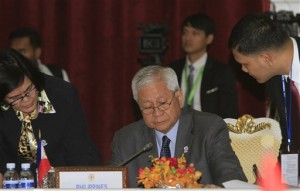US, PH start joint war games amid China tension
Thousands of US and Filipino troops began annual military exercises on Friday that the Philippines said were vital to building its defense capabilities to face the rising threat of China.
Foreign Secretary Albert del Rosario used the launch of the 12-day Balikatan maneuvers to accuse China of destabilizing Asia with aggressive and illegal actions in the South China Sea.
“For our region excessive and exaggerated maritime and territorial claims have not only created uncertainty but have undermined the rule of law,” del Rosario said in a speech at the nation’s military headquarters in Manila.
“Regional peace and stability have been placed at serious risk.” Del Rosario later said he was referring specifically to China.
China claims most of the South China Sea, including waters and tiny rock outcrops near the coasts of smaller neighbors such as the Philippines.
Tensions have escalated in recent years as China has sought to stamp its authority over the region.
Appeal to UN
The Philippines has accused China of occupying a shoal close to its main island, and appealed to the United Nations to rule on the validity of Chinese claims to the resource-rich sea.
And last month China’s navy began patrolling disputed waters, sending vessels to within 80 kilometers of the Malaysian coast and at one point firing “warning signal shells” at a Vietnamese boat.
Amid the rising tensions, the Philippines has sought closer diplomatic and military ties with the United States, its former colonial ruler.
The two countries share a 61-year-old mutual defense pact, which requires the United States to come to the aid of the Philippines if it is attacked.
Del Rosario said the Balikatan (shoulder-to-shoulder) exercises were a very important part of the Philippines’ efforts to secure US support.
“For my country we need to secure our borders and protect our territorial integrity more vigorously than we have before,” he said.
“Balikatan… is an important contribution in not only preparing both our armed forces to work together but also in building my country’s own capacity to defend itself.” The maneuvers involve more than 8,000 US and Filipino troops, 30 military aircraft including a dozen US F/A-18 Hornets and three naval vessels, the two countries said.
Friday’s launch only involved speeches from military and political leaders from the two sides.
Media access
The media will be allowed access to exercises next week, some of which will involve combat drills and simulated rescue work for natural disasters.
Del Rosario also said it was vital for the Philippines to have more US forces rotate throughout the year, and not just for scheduled exercises such as Balikatan.
“This will be crucial in our efforts in the short term to establish our minimum credible defense posture, and in the long term to build a more robust national defense structure,” he said, without giving details.
The Philippines said last year it would allow more US troops to visit for short durations, such as for naval port calls, although it ruled out a return of permanent bases.
On the other hand, a group of environmental activists began a protest caravan to Zambales on Friday to protest the presence of US soldiers in the Balikatan exercises.
Clemente Bautista Jr., spokesperson of the Kalikasan People’s Network for the Environment (Kalikasan PNE), said the group launched the protest caravan composed of 14 vehicles ferrying 250 activists in front of Camp Aguinaldo.
“We are going there [Zambales] to let people know why the VFA (Visiting Forces Agreement, which paved the way for the Balikatan exercises) is harmful to us,” he said.
No history of quarrels
He said activists fear that the VFA would drag the country into conflict, should the belligerence by North Korea escalates.
“In our history, we have not had any quarrel with other countries in Asia. We did not have to go to war with any of them,” he said.
Bautista said the protest caravan would also engage the Subic communities in a discussion about the environment.
“We do not want a repeat of toxic dumping and ship grounding in our seas and coral reefs. We are calling for an immediate moratorium on entry of US warships, particularly those which are nuclear armed like the USS Cheyenne,” he said.
According to Northern Luzon Command chief, Lt. Gen. Anthony Alcantara, the April 5-17 military event begins with two days of academic discussions on disaster response, followed by a two-day crisis action planning session, a one-day miniexercise, seven days of practical exercises and a one-day review of their activities. Soldiers will also undertake civic action projects such as building two classrooms and a water reservoir in Palauig, Zambales. AFP with reports from Jerome Aning in Manila, Robert Gonzaga and Cesar Villa, Inquirer Central Luzon















